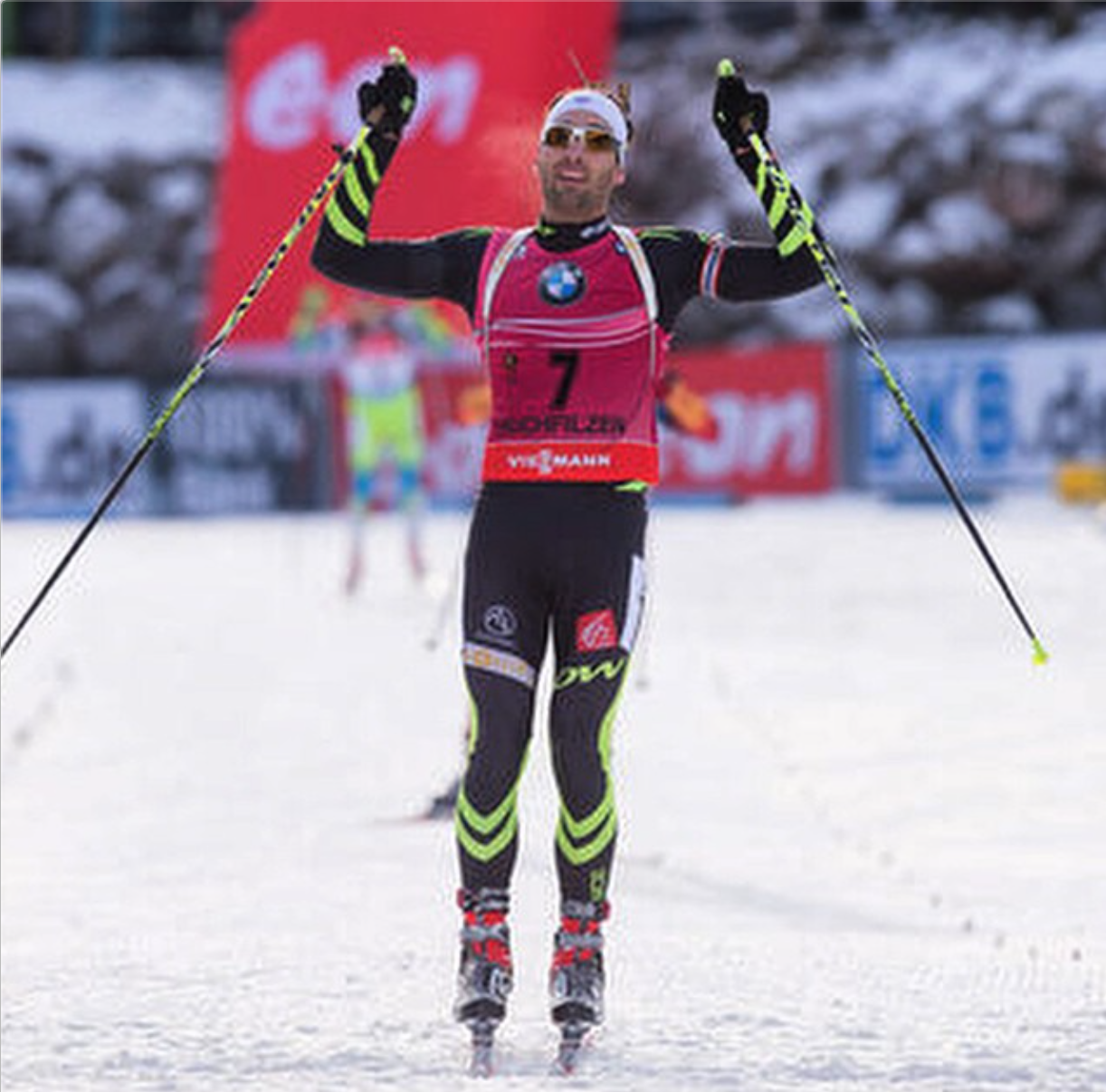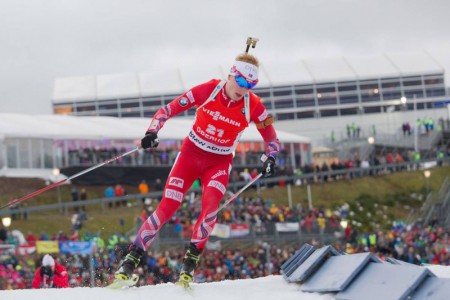
Warm overnight temperatures, strong winds, and rain in Oberhof Friday night meant trouble for the IBU World Cup biathlon men’s 10 k sprint race Saturday morning. Start time was pushed back to mid afternoon to allow time for snow to be shipped in and repair the course. Even with the fixes, organizers couldn’t cobble together the 3.3 k required for the three-loop race – all they had was 2.5 k worth of snow.

So, very unusually in biathlon were loops between shooting stages are always the same length, they used a 2.5 k loop. The men skied one loop, then shot, then skied a double loop before the final shooting stage. That put 5 k in the middle of the race, a longer bout of skiing than is ever completed at once in regular World Cup formats.
“They had to change the course because the snow totally melted,” American biathlete Tim Burke said in a phone interview. “They made it a 2.5 k loop, so it was 2.5 k and then prone shooting, then do a double loop for 5 k, then shoot standing, then 2.5 k. That changes it up, definitely a decent amount, having a 5 k in the middle of the race makes it interesting and definitely changes tactics a little bit.”
That was just one of the challenges faced by racers in a competition Burke called completely unfair. Wind gusts were strong – but they also died, giving some competitors much better shooting conditions than others.
Martin Fourcade of France, the double Olympic gold medalist from Sochi, won the competition to retain the overall lead in World Cup standings. But even he didn’t think that biathlon should be raced this way.
“It’s my seventh time in Oberhof; today were perhaps the best weather conditions, and this is not a joke,” he said in an IBU press conference. “So we have to think about something. Oberhof can be really good but not in the beginning of January.”
Some of the problems were equally bad for everyone: for instance the ski trails. Ice mixed with slush to create a dangerous mix of snow types that claimed many victims. Several athletes broke skies and poles as a result of crashes on the technical downhill.
Only two of the ninety-nine racers avoided skiing penalty loops, a rare occurrence on the World Cup – but the number of loops required was the thing. Was it one? Or six? And did that racer also wait a minute instead of the usual 25 seconds on the range, hoping the wind would die down?
Despite all this, Fourcade found himself in a familiar spot: atop the podium. Sitting out the relay, Saturday’s sprint was Fourcade’s first chance to test his training from the holiday break. Though Fourcade told the IBU he did not need the extra break, he used it to train and prepare for the rest of the season.
After posting a slow opening lap, Fourcade shot slowly prone though still had a penalty. Leaving the final shooting, the French star was seven seconds behind the time set by Ole Einar Bjørndalen of Norway. That didn’t leave Fourcade with much hope of winning: “I wasn’t confident at all,” he said in the press conference, crediting Bjørndalen for being very strong this year.
By the finish, though Fourcade picked up the pace and opened a 4.4 second gap over the Norwegian veteran. The pair retained their first and second place positions, although Timofey Lapshin of Russia used a late charge to bump Norway’s Johannes Thingnes Bø off the podium and snag third, +15.7.
Having won individual races nine time in Oberhof, Bjørndalen was one of very few skiers looking relaxed and confident taking the downhill’s with spend would have to settle for silver. He said in the IBU press conference, “I felt good and my shooting was much better than in the relay today, the condition were tricky, sometime we had wind sometimes no wind.”
Johannes Thingnes Bø posted the best opening lap time but was denied a podium due to his two shooting errors, finishing 18.2 second back. It took a lot for Lapshin to bump him off; the wind was so strong on course that not only did he have to shoot well, but he struggled just to cross the finish line in a strong headwind.
Benjamin Weger of Swizerland nearly matched the speed of Bø, finishing 19 second back in fifth. Latvia’s Andrejs Rastorogujevs had the fastest ski time of the day but with three mistakes in the range finished sixth 21.4 seconds back.
Weger, who a few years ago earned the first-ever podium by a Swiss biathlete but has since lacked that level of performance, was pleased to see it come back.
“I am happy to be back in the top 10, after all with one less miss I could have won this race,” he told the IBU in a finish-line interview. “It’s a good motivation. I am satisfied and looking forward to the next races.”
Stay tuned for interviews with the North American biathletes. Lowell Bailey and Nathan Smith led the way, finishing 34th and 35th for the United States and Canada, respectively.
-Chelsea Little contributed reporting.



